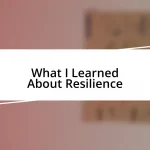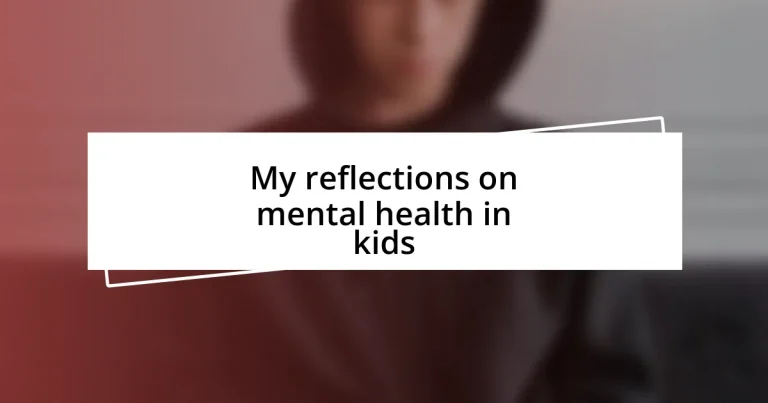Key takeaways:
- Understanding child mental health is essential for emotional, social, and academic development; subtle behavioral changes can indicate deeper issues.
- Early intervention is crucial as it prevents worsening symptoms, enhances coping strategies, and promotes lifelong resilience in children.
- Recognizing signs of mental distress—such as withdrawal, mood changes, and sleeping issues—allows for timely support and intervention.
- Creating a safe environment for emotional expression and incorporating physical activity and mindfulness practices can significantly improve children’s mental health.
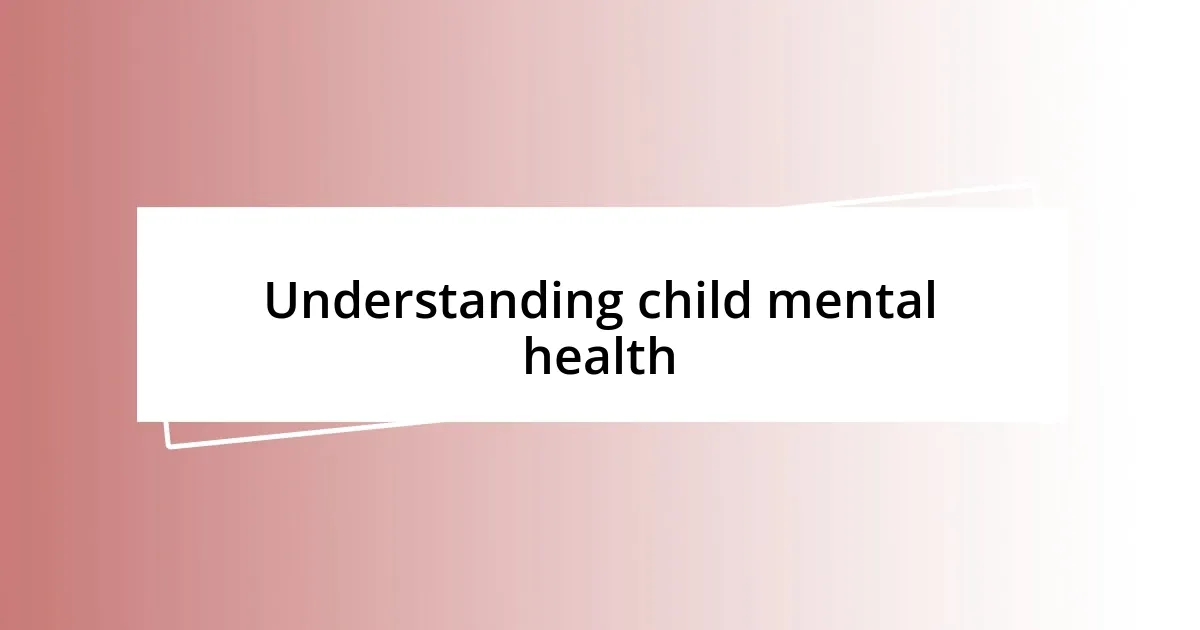
Understanding child mental health
Understanding child mental health is crucial, as it significantly impacts a child’s emotional, social, and academic development. I’ve often wondered how subtle changes in a child’s behavior can indicate deeper emotional struggles. For instance, when I noticed a friend’s son suddenly withdrawing from social activities he once loved, it made me reflect on how invisible battles can quietly develop.
It’s important to recognize that mental health issues in children can manifest in various ways, sometimes confusing parents and caregivers. I remember a time when my younger brother became increasingly irritable. At first, my parents attributed it to typical teenage angst, but it turned out he was experiencing anxiety related to school pressures. This experience taught me how crucial it is to pay close attention to behaviors that seem out of character.
Let’s not forget that mental health is just as important as physical health, yet it’s often overlooked in kids. Have you ever considered how asking a child about their feelings could change their world? In my experience, simple conversations can create a safe space for kids to express what’s really going on inside, allowing for early intervention and support. Recognizing and understanding the signs of mental health issues in children can empower us to guide them toward a healthier future.
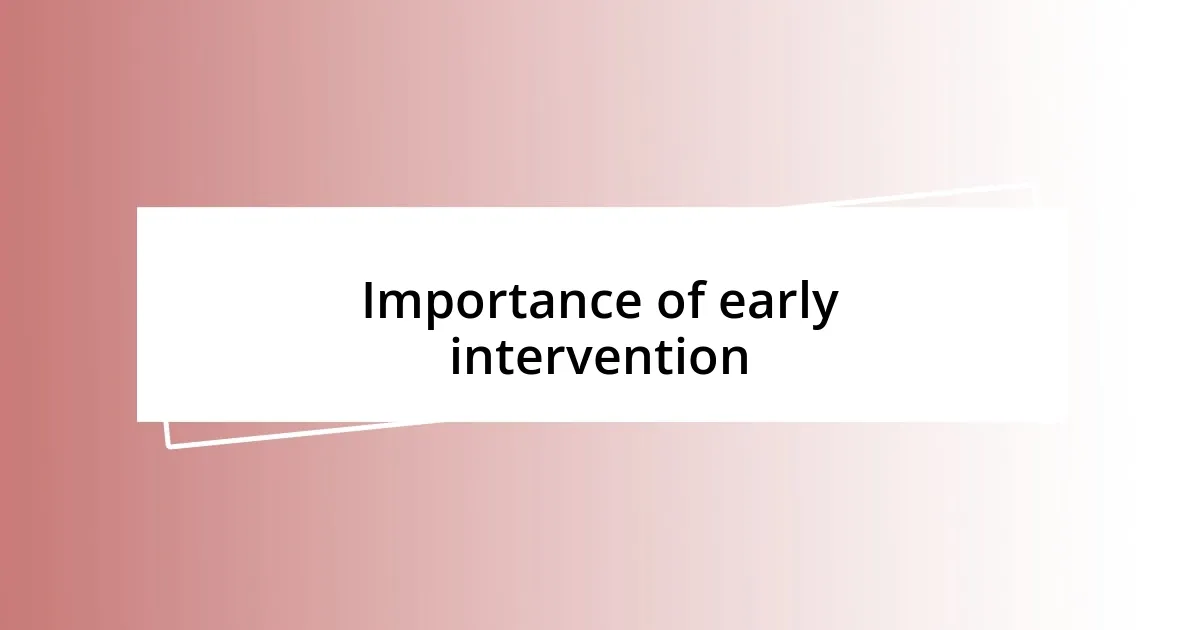
Importance of early intervention
Early intervention in children’s mental health is vital because it can shape their ability to cope with challenges for years to come. I recall a vivid moment when, as a school volunteer, I witnessed a struggling student transform after receiving early support. Just weeks of tailored guidance helped him gradually open up about his feelings. It was a powerful reminder of how timely intervention can lead to remarkable changes, sometimes in ways we can’t fully appreciate until we see it unfold.
Consider these key points about the importance of early intervention:
- Prevention of worsening symptoms: Addressing issues early can stop them from escalating into more serious problems later.
- Improved coping strategies: Getting help sooner equips children with tools to manage their emotions effectively.
- Enhanced academic performance: Children often perform better in school when their mental health needs are met, leading to greater engagement and self-esteem.
- Stronger relationships: Early support fosters better communication and trust, not just between the child and caregivers, but also among peers.
- Lifelong resilience: Children who receive early intervention are more likely to develop resilience, helping them face future challenges with confidence.
Reflecting on these aspects, I feel a deep sense of responsibility for encouraging open dialogues about mental health in the lives of children. Early intervention is not just a strategy; it’s an essential investment in their future.
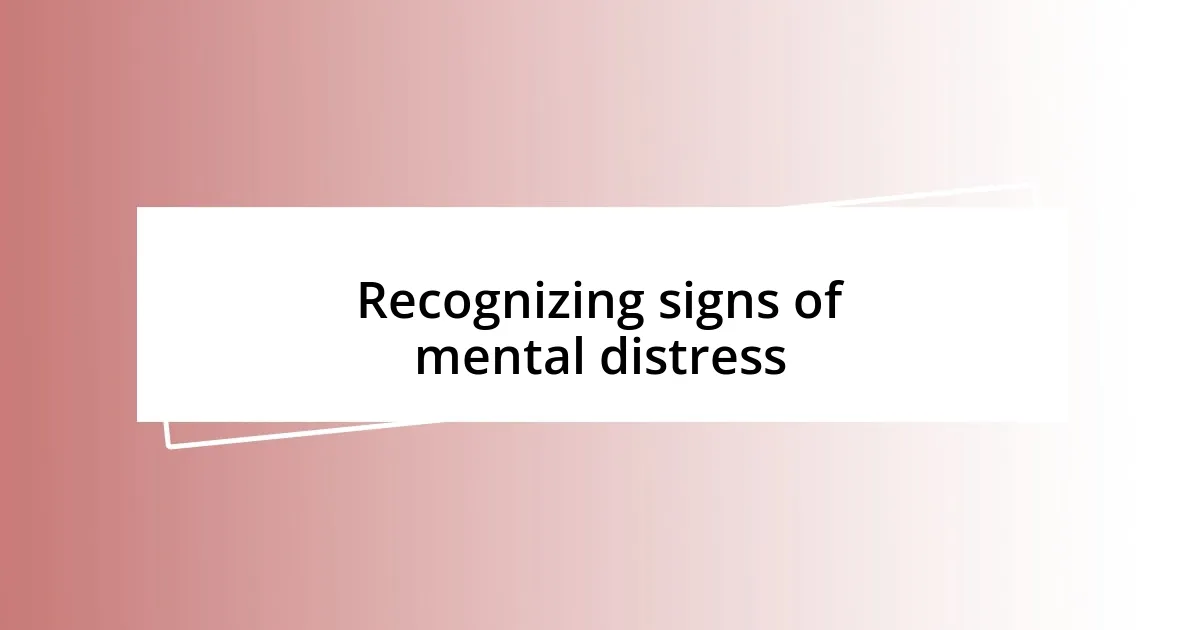
Recognizing signs of mental distress
Recognizing signs of mental distress in children can often feel like decoding a secret language. I remember a day when my niece, usually filled with laughter, became unusually quiet while playing. I thought she might just be tired, but I soon realized the shift in her mood hinted at deeper feelings of sadness. It demonstrated how vital it is for adults to be vigilant and tuned in to those subtle changes; they can often reveal what’s lurking beneath the surface.
It’s essential to differentiate between typical childhood behavior and signs of distress. For instance, while mood swings can be part of growing up, prolonged episodes of irritability might indicate that something is off. In my case, a close friend’s daughter displayed sudden changes in her sleeping patterns—falling asleep in class and waking up multiple times at night. Initially dismissed as just a phase, this behavior turned out to be a response to anxiety fueled by school pressures. These examples make me think about how easily we can overlook signs that need our attention.
Being proactive in recognizing these signs can be incredibly beneficial for a child’s well-being. Have you ever thought about what a simple conversation could do? During a park outing, I noticed a child who used to frequent playgrounds now hesitating to join in games with peers. When I asked her about it, she opened up about feeling excluded, which was heart-wrenching. It reminded me that understanding and empathy can help children articulate their feelings and guide us in providing the necessary support.
| Signs of Mental Distress | Possible Indicators |
|---|---|
| Withdrawal from activities | Difficulty engaging in previously enjoyed hobbies |
| Changes in mood | Frequent sadness or irritability |
| Sleeping issues | Staying up late or difficulty waking |
| Academic decline | Declining grades or lack of interest in school work |
| Physical complaints | Frequent headaches or stomachaches with no medical explanation |
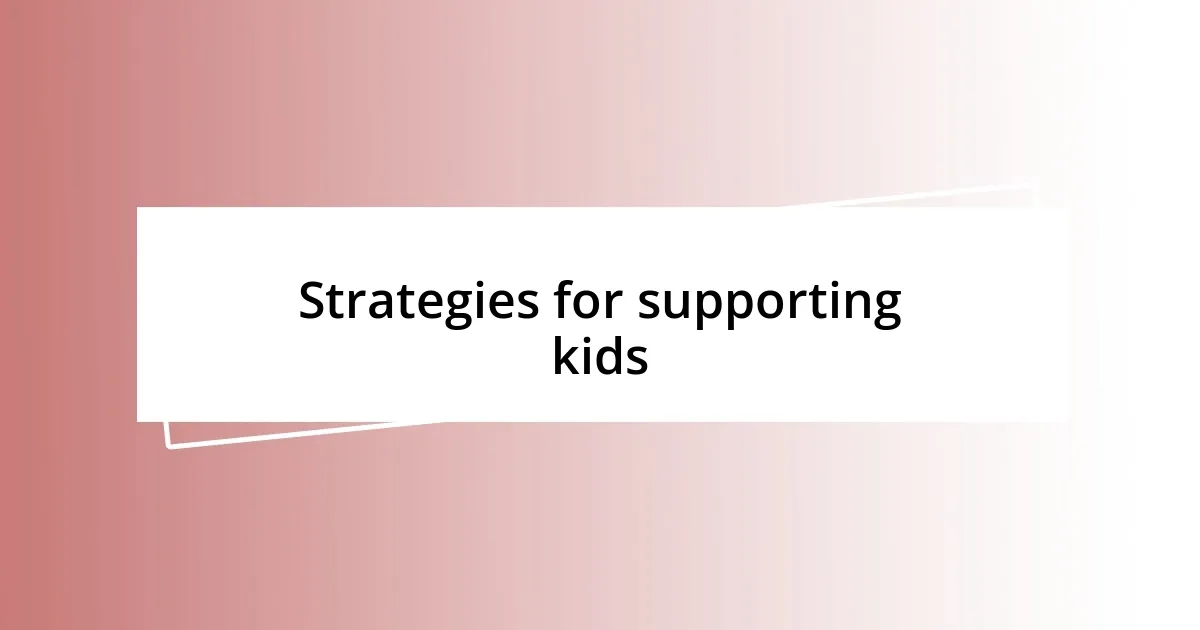
Strategies for supporting kids
One effective way to support kids is to foster an environment where they feel safe to express their emotions. I recall a time when my best friend’s son struggled to articulate his feelings after a tough day at school. By creating a safe space—just by asking him about his day and genuinely listening—I saw him gradually open up about his frustrations. Have you ever noticed how simply showing we care can encourage children to share what’s on their minds? This simple strategy not only strengthens communication but also builds trust, making it easier for them to seek help when they need it.
Encouraging regular physical activity can be another game changer for mental health. I had a friend who, after starting a family hike tradition on weekends, noticed a significant improvement in her children’s mood and energy levels. Nature has a way of refreshing our minds and spirits, doesn’t it? Engaging kids in outdoor activities provides them not just with exercise, which is crucial for brain health, but also with opportunities to bond with family and friends, fostering social connections that can buffer against anxiety and depression.
Lastly, I believe incorporating mindfulness practices into daily routines can have profound effects on children’s emotional well-being. I once attended a workshop where a teacher shared how a simple five-minute breathing exercise transformed her classroom’s atmosphere. The kids felt calmer and more centered, which in turn improved their focus and reduced stress levels. Have you ever tried meditative practices with children? It can be a wonderful way for them to learn how to manage overwhelming feelings and stay grounded during tough moments. Simple techniques, like deep breathing or guided imagery, can empower kids with lifelong tools for emotional regulation.
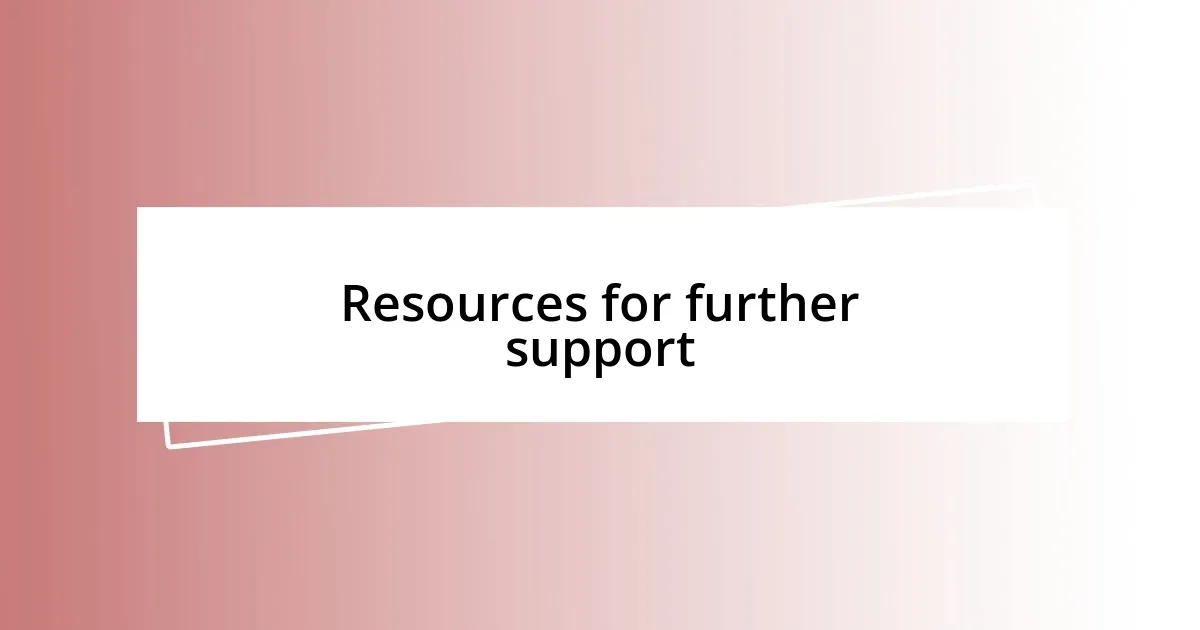
Resources for further support
When searching for resources to support children’s mental health, I often direct parents to community programs and counseling services. I recall a local mental health fair I attended, where various organizations offered workshops and support groups. Connecting with professionals who understand children’s unique needs can be a lifeline. Have you ever considered the wealth of knowledge available just around the corner?
Many families benefit from online resources as well. I’ve come across websites dedicated to mental health that provide articles, activities, and even forums where parents can share their experiences. For instance, sites like Child Mind Institute offer practical advice and strategies. It’s comforting to know that reaching out can be as easy as a few clicks—how great is it to find community and understanding online?
Additionally, don’t underestimate the power of books on mental health tailored for kids. I remember gifting my neighbor’s child a book about feelings when she seemed withdrawn. This simple act became a bridge for discussions about emotions, and we turned those pages together. It was amazing to see how literature can open dialogues. Have you explored this avenue with children in your life? It’s an impactful way to help them understand and express what they’re going through.
